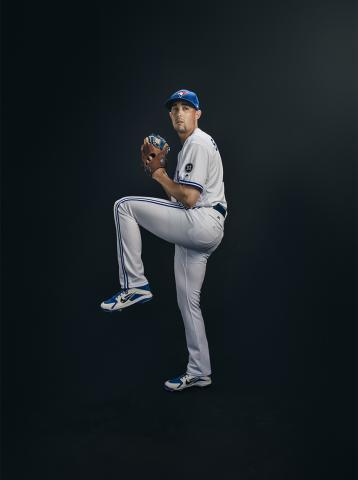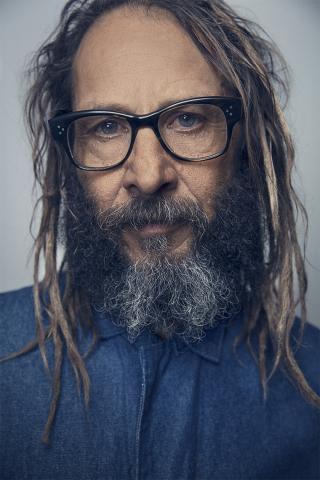KC Armstrong: So what program are you in?
Kerry Maguire: I am a fine arts student; I’m in my second year so I don’t have to declare my major yet. What about you? What did you take at ACAD?
ARMSTRONG: I took photography. So you’re still working with a bunch of different media?
MAGUIRE: Yeah! It’s really fun. What year did you graduate?
ARMSTRONG: I graduated in 1997. I’m old!
MAGUIRE: Was it “ACAD” when you went here or was it Alberta College of Art (ACA)?
ARMSTRONG: Actually, I think we were the first class to graduate as ACAD, if I am not mistaken.
MAGUIRE: You still work mainly as a photographer?
ARMSTRONG: Yeah, I’m still doing that. Which is a little bit rare! What happens to a lot of people is they end up in a lot of other niches like graphic design.
MAGUIRE: Do you exclusively work in photography?
ARMSTRONG: Yep, it’s my sole income.

Aaron Sanchez. Photograph by KC Armstrong.
MAGUIRE: How has what you do evolved since you graduated?
ARMSTRONG: I guess, I started off ... I was trying to shoot mostly rock and roll photos. Fairly quickly after I was out of school Napster happened, and the music business totally changed. It became a much less viable career path. I started doing general advertising, and when I moved to Toronto things evolved towards more portrait work and a little more entertainment stuff.
MAGUIRE: How did your time at ACAD affect this path?
ARMSTRONG: Hmm, I don’t know. The school gave me a place and the time to figure myself out. Professionally, at the time at least, the school didn’t offer me much.
MAGUIRE: Did you go to school straight out of high school?
ARMSTRONG: No, I didn’t. I think I was four years out of high school. I was in my mid-twenties.
MAGUIRE: I’m the same age.
ARMSTRONG: Good! Smart! Yeah, it’s valuable to take your time. I’m a big proponent of that. I think sometimes people rush to go to school because they are “supposed” to, and they have no idea what they are doing. That could potentially affect the rest of your life – it’s a pretty big deal.
MAGUIRE: After graduation, what obstacles did you encounter and how did you overcome them?
ARMSTRONG: There are always obstacles, I find. You’re constantly overcoming them, which is kind of what makes it interesting. I guess the biggest obstacle as a photographer has always been finding a marketplace. That’s why I’ve moved around. You have to find what works for you and for what you want to do. And that’s always evolving – at a certain moment you might feel like you have found it, and then it doesn’t end up being right in the long run. Just knowing you are, and being confident with what you do. It’s always evolving, going up and down. You never reach a pinnacle where you can say, “yeah! I’ve got it down.”

Tony Alva. Photo by KC Armstrong.
MAGUIRE: Given your experiences, what advice would you give to students when establishing a creative business?
ARMSTRONG: The biggest thing I would say is don’t undersell yourself. I think a lot of young people, in photography specifically, give away their talent for free when they graduate because they just want to work. They don’t realize that it can mess business up for everyone in the long run, including themselves. A lot of those people come and go. They will be around for a few years and then disappear. It’s obviously not a very viable way to go about it.
I think that schools could do a bit better job with teaching the business side of things. I’m not sure what ACAD is like now, but I would have benefited from knowing what you should charge, and what you should and shouldn’t give away.
MAGUIRE: So you didn’t really learn any specifics like that?
ARMSTRONG: No, not really. I don’t know what it’s like there now, but I think it was a little different when I was at school. Digital photography hadn’t really happened yet; there were much more costs involved in taking a photograph. You had to buy film, and then get it processed, and then you had to get it printed. Those things are kind of gone now because of the digital revolution. It’s funny – a lot of people who teach photography, or are still photographers, don’t want to give away any secrets. They don’t want to teach people those kinds of [business] things, which is silly. You want people to know what should be charged for different kinds of jobs.
You can never teach it all, I understand. Sometimes you have to balance keeping a good relationship with cost, and but still not giving anything away.

Connor McDavid. Photo by KC Armstrong.
MAGUIRE: How are creative people valuable to the greater cultural and economic context?
ARMSTRONG: I think that we are very valuable. Creative people are the cultural fibre of the communities they are in. Going to art school seems to be more popular now that before; it wasn’t something I even know about or thought of fresh out of high school. I didn’t know it existed, even. I do think Calgary has come a long way, culturally.
MAGUIRE: I didn’t really know it existed either. I knew ACAD was there, and had a vague concept of what “art school” was, but I had no idea what actually happened there. Have you remained in contact with ACAD since you graduated?
ARMSTRONG: Not really, this is the first time they’ve reached out to me. I was kind of a black sheep when I went there [laughs]. I think this [alumni interview] project is great, though; there’s lots of high-level artists that have graduated from ACAD. They could really take advantage of that, even from a marketing point of view, and also to enrich the students that are there now. There’s more focus on graduates who stuck around Calgary, but there’s people all over the place who have done awesome stuff. They should be recognized.
MAGUIRE: For me, being able to talk to people from all different kinds of practices is great. Every time I have one of these conversations, I learn so much. I reference these conversations all of the time with fellow students. We don’t really know what’s going to happen when we graduate, but now I have all of these great conversations and perspectives to reference.
ARMSTRONG: I wish I had that when I was in school! That’s good. I would definitely be interested in working with the school in the future

Natalie Spooner. Photo by KC Armstrong.